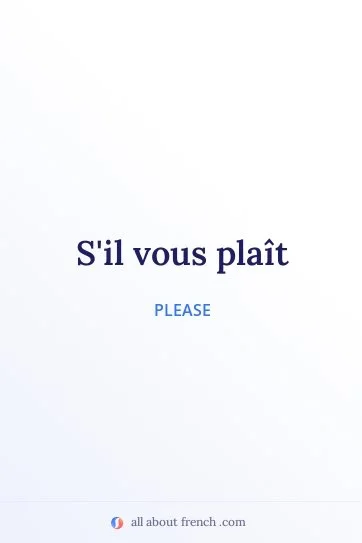
On this page, we are going to show you all the things you have to know about the basic sentence "S'il vous plaît". It includes a detailed definition of what it is and how you can use it in everyday life with an audio example. Plus, we also added some useful stuff like slow pronunciation audio, synonym, dialogue example and more!
Translation : Please
Register : Formal - Basic
Slow
Normal
IPA : / sil vu plɛ /

This is a must-know sentence for everybody trying to learn French as we use it (massively) every day. It literally means "If it pleases you" which is translated in English as "Please".
There are two variations that you should know: the first one is "S'il te plaît" which you should use when talking to only one person and if you "know" this person already (a friend, a lover, a family member or anybody you can be informal with).
For example: "Papa, tu peux m'aider s'il te plait ?" (Dad, can you help me, please?)
Now, it's different if you are talking to several people and/or people you should show respect (strangers, elderly, police, when meeting colleagues, etc.). Here you should use: "S'il vous plait".
For example: "Pouvez-vous me donner le dossier s'il vous plaît ?" (Can you give me the folder please?)
Also, both are invariable, so never add an "s" at "plait" or at "il". Just like you should never conjugate it with the genre and say "S'elle te plait" for example.
Finally, you will probably often see variations of "plait" with 'î' instead of 'i'. Since 1990, both are ok and we prefer using the version with the "simple i" but it's still used for official documents and some other situations. Anyway, you will NEVER be wrong by not putting the accent over the 'i'.
In some part of Eastern France and Belgium, people are using "S'il vous plait" as a way to say "There you go / Here is" when politely giving something to you.
For example: "Pouvez-vous me passer le sel s'il vous plaît ?" (Can you pass me the salt please?) then the person will grab the salt, give it to you and say "S'il vous plaît".
But this person is not really asking you "please" but just being polite, you can see it as "please accept this salt". And so you simply say: "Merci" (Thank you).
The "full" synonyms are:
And if you want something stronger, use one of these:
N.B: Depending on context, "Je t'en prie" can also mean: "You are welcome"
Dialogue
Pouvez-vous m'aider s'il vous plaît ?
Can you help me, please?
With pleasure
Thanks from the bottom of my heart!
Learn French with Audio Stories
Learn French the easy way with our French - English
parallel texts with slow French audio
 Start Learning
Start Learning 